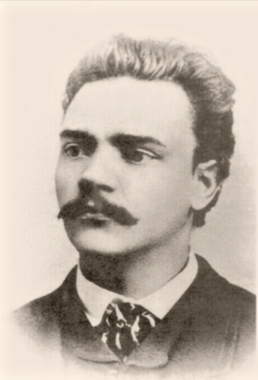These life stories may contain descriptions of childhood trauma and abuse, as well as images, voices and names of people now deceased. If you need help, you can find contact details for some relevant support services on our support page.
Internationally recognised Czech composer, Antonin Leopold Dvorak (1841-1904), was in kinship and foster care as a teenager.
Dvorak was the eldest of nine children, born to Frantisek Dvorak and Anna Zdenkova in Nelahozeves, a then Bohemian (now Czech) village on the Vitava River, north of Prague. His father was an innkeeper, a butcher and a professional Zither player.
The child’s obvious talent for music was encouraged in his family. The young Dvorak was taught to play the violin at primary school and by the time he was six he could accompany dancers at the inn.
In 1853, when Antonin was twelve, he was sent to live for three years with his aunt and uncle in Zionice, about 18 km away. In the local school he took German lessons and he also took violin, piano, organ and music theory lessons from Antonin Liehmann. It was while he was in Zionice that the boy began composing.
In 1855 his family moved to Zionice and Antonin helped his father out in the butchering business he established.
To further practice his German – apparently at the time an essential for getting along with those in the middle and upper classes – Antonin was sent to live with a German family for twelve months when he was fifteen and attend a German language school in Bohmisch Kamnitz, now Ceska Kamenice, 104 km north of Prague.
From the age of sixteen Antonin Dvorak made his home in Prague. He first attended the Institute for Church Music and a general school. After graduating he played viola for an entertainment orchestra for nine years and gave piano lessons privately.
He married Anna Cermakova (1854-1931) in 1873 and the couple had nine children, but three died in infancy.
Dvorak became a prolific composer, but did not make a name for himself until the 1870s. In 1875 he received the first of five annual grants from the Austrian government and two of the grant judges, Eduard Hanslick and Johannes Brahms, began promoting his work in both Austria and Germany.
In 1877 Brahms recommended Dvorak’s compositions to his publisher and by 1879 his work had been performed in Europe, London and New York. Dvorak travelled and performed extensively from the 1880s, including to the United States in the 1890s. Towards the end of his life, many considered Antonin Dvorak “to be the greatest of all living composers” (Beveridge).
References:
Beveridge, David. “Antonin Dvorak: His life, his music, his legacy”. DAHA Dvorak American Heritage Association. https://www.dvoraknyc.org/bio/
Antonin Dvorak – Famous Composers in History. Worldatlas. https://www.worldatlas.com/articles/antonin-dvorak-famous-composers-in-history.html
Image available here.
